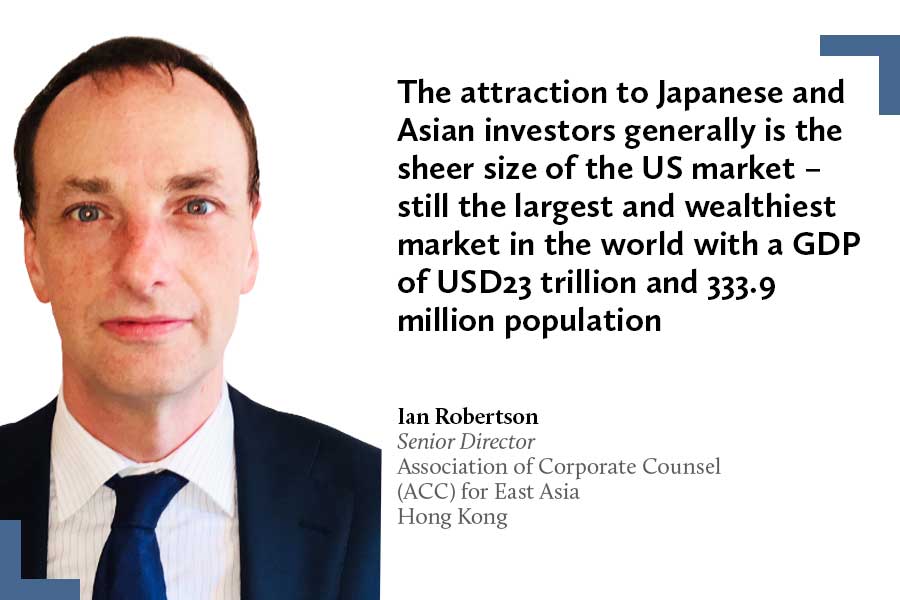As the world acknowledges the real threat of global recession, where and how a company should invest has never been more challenging. General counsel hold the keys to unlocking opportunity, and more than ever are relied upon for sound advice. There are many positives, but market knowledge is paramount in an insecure world. Putro Harnowo sheds light by turning to key trends
Following a significant rebound last year with booming M&A markets and rapid growth in international project finance, the UN Conference on Trade and Development’s (UNCTAD) World Investment Report 2022 highlighted that the war in Ukraine and the lingering effects of the pandemic have caused a triple crisis regarding food, fuel and finance in many countries.
The June report expected global foreign direct investment (FDI) flows in 2022 to move on a downward trajectory or remain flat at best, while signalling an increasing trend in FDI screening among developed countries.
The UNCTAD report notes that the recovery brought growth in all regions last year, mostly caused by M&A transactions and high levels of retained earnings of multinational enterprises. In 2021, multinationals from developed economies more than doubled their investments abroad to USD1.3 trillion from USD408 billion the previous year.
For in-house counsel at companies either investing or considering investment abroad, there are trends to be both welcomed and wary of. Evolutions of regulation to accompany policies surrounding sovereignty and security need constant vigilance from legal teams, and trends outbound and inbound reflect these vigilant times.
“Companies recognise they must make their supply chains resilient, and to do so will require investment abroad,” says Steven Okun, founder and CEO of APAC Advisors and chair of AmChams of Asia-Pacific in Singapore.
Okun says trade agreements provide great flexibility in the region to diversify their supply chains – of which companies are just starting to take advantage. The US-led, 14-nation Indo-Pacific Economic Framework (IPEF) is committed to making supply chains more resilient, robust and integrated, which could include creating an information sharing and crisis response mechanism, strengthening supply chain logistics and transparency, and investing in training and development to ensure enough skilled workers.
“These actions, if taken, will further increase the appetite for Asian companies to invest abroad,” says Okun.
Being the region’s powerhouse, Japan is expected to continue to expand abroad and seek targets of investment. “Japanese companies need to invest abroad since the economic growth rate has been slim domestically,” says Junko Suetomi, a partner at Baker McKenzie’s Tokyo office. “Overall in Asia, life science, artificial intelligence [AI], the IT industry, semiconductor industry as well as energy sectors are the industries in which I anticipate seeing an increase in investment.”
Companies interested in investing in Japan should note the Foreign Exchange and Foreign Trade Act, which requires foreign investors to submit pre-transaction notifications filed through the Bank of Japan before acquiring equity, changing a shareholder in a reorganisation, or taking certain other corporate actions. The 2019 amendment lowered the ownership threshold for foreign investment approval from 10% to 1% in companies regarded as sensitive to national security.
Ian Robertson, senior director of the Association of Corporate Counsel (ACC) for East Asia in Hong Kong, says that the US is still the world’s largest market and is relatively straightforward from a foreign investment point of view.
“The attraction to Japanese and Asian investors generally is the sheer size of the US market – still the largest and wealthiest in the world with a GDP of USD23 trillion and 333.9 million population,” says Robertson. “An added attraction for Asian investors generally is the ability to establish research and development units in the US, which, despite all the rhetoric about China, is still where most of the world’s innovation gets done.”
CHINA’S CHALLENGES
Following a strong year for deals in 2021, China has experienced a modest slowdown in inbound and outbound total transaction value this year. According to data from China’s Ministry of Commerce (MOFCOM), outbound direct investment grew 9% and reached USD145.2 billion in 2021, mainly aimed at the Belt and Road Initiative (BRI) and Asean countries. Meanwhile, investment into the US dropped 30% in 2021 from the previous year, reaching only USD6 billion.
Carl Li, a senior partner at AllBright Law Offices in Shanghai, says the covid-19 situation is restricting travel, and the political tensions are making it very difficult to conduct large-sized transactions in major developed markets.
“Chinese enterprises have found themselves in a progressively complex environment when investing overseas,” says Li. “Regional geopolitical tension continues to bring challenges to global economic momentum.”
Li argues that the pandemic’s resurgence in China has also had an effect on economic growth and the profitability of enterprises. As a result, Chinese enterprises may lean towards caution when investing abroad in the short term. “Nonetheless, overseas markets that have transformational potential are still attractive to Chinese enterprises, such as in the new energy automotive sector,” he says.
In terms of regulation, Li observes that China’s outbound investment policies haven’t changed dramatically in the past 12 months, and the focus continues to be on encouraging companies to do the right outbound transactions in preferred sectors such as healthcare, technology, advanced manufacturing, energy and resources. On the inbound side, stronger GDP growth and the removal of certain investment restrictions have helped sustain and boost FDI.
“To boost FDI amid the crisis, the government of China has revised its negative list, liberalising several more industries for investment, and removing restrictions in others,” says Li. “In addition, the recently released Five-Year Plan and long-term vision for 2035 indicate the government’s intention to ease more restrictions in the near future to boost FDI to pre-pandemic levels.”
Following an easing of regulations as China softens its attitude toward big tech companies, Li anticipates that technology or software and tech-enabled services will continue to lead the way in deal volume.
“Investment and M&A activities related to generic drugs, green energy and data assets are likely to boom, while M&A activity in other sections is likely to slow down or even decrease, especially in highly regulated sectors such as education,” says Li. Beyond global macroeconomic headwinds, Marcia Ellis, partner and global chair of Morrison Foerster’s private equity group in Hong Kong, says China-related transactions are being impacted by the evolving domestic regulatory landscape and the evolution of international regulations and enforcement priorities, with a specific impact on China-related transactions.
“Looking abroad, geopolitical tensions and the steady rise of national security review regimes around the world have continued to put a damper on outbound activity,” says Ellis. “Many geographies where good targets have been located historically, such as the US and Europe, have doubled down on reviews of foreign investment in sensitive sectors.
“As a consequence, Chinese acquirers are often looking further afield for opportunities in markets like Southeast Asia, the Middle East and Latin America.”
Ellis believes that longer-term investor sentiment across corporate and private equity players active in China remains positive. Strategic M&A transactions in sectors that support China’s national policy directives aimed at decarbonisation, digitalisation and domestic consumption are attractive, as well as investments that can be linked to the general theme of common prosperity.
You must be a
subscribersubscribersubscribersubscriber
to read this content, please
subscribesubscribesubscribesubscribe
today.
For group subscribers, please click here to access.
Interested in group subscription? Please contact us.






















